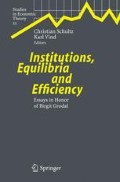Summary
We consider economies with incomplete markets, one good per state, two periods, t=0, 1, private ownership of initial endowments, a single firm, and no assets other than shares in this firm. In Dierker, Dierker, Grodal (2002), we give an example of such an economy in which all market equilibria are constrained inefficient. In this paper, we weaken the concept of constrained efficiency by taking away the planner’s right to determine consumers’ investments. An allocation is called minimally constrained efficient if a planner, who can only determine the production plan and the distribution of consumption at t=0, cannot find a Pareto improvement. We present an example with arbitrarily small income effects in which no market equilibrium is minimally constrained efficient.
We are grateful to an anonymous referee for very valuable comments. E. and H. Dierker would like to thank the Institute of Economics, University of Copenhagen, for its hospitality and its financial support.
Access this chapter
Tax calculation will be finalised at checkout
Purchases are for personal use only
Preview
Unable to display preview. Download preview PDF.
References
Cole, H., Prescott, E.: Valuation equilibrium with clubs. Journal of Economic Theory 74, 19–39 (1997)
DeMarzo, P.: Majority voting and corporate control: the role of the dominant shareholder. Review of Economic Studies 60, 713–734 (1993)
Dhillon, A., Mertens, J.-F.: Relative utilitarianism. Econometrica 67, 471–498 (1999)
Dierker, E., Dierker, H., Grodal, B.: Nonexistence of constrained efficient equilibria when markets are incomplete. Econometrica 70, 1245–1251 (2002)
Drèze, J. H.: Investment under private ownership: optimality, equilibrium and stability. In: Drèze, J. H. (ed.) Allocation under uncertainty; equilibrium and optimality, pp. 129–165. New York: Wiley 1974
Geanakoplos, J., Magill, M., Quinzii, M., Drèze, J.: Generic inefficiency of stock market equilibrium when markets are incomplete. Journal of Mathematical Economics 19, 113–151 (1990)
Geraats, P., Haller, H.: Shareholders’ choice. Journal of Economics 68, 111–135 (1998)
Gravel, N.: On the difficulty of combining actual and potential criteria for an increase in social welfare. Economic Theory 17, 163–180 (2001)
Grossman, S.: A characterization of the optimality of equilibrium in incomplete markets. Journal of Economic Theory 15, 1–15 (1977)
Guesnerie, R.: Pareto optimality in non-convex economies. Econometrica 43, 1–30 (1975)
Magill, M., Quinzii, M.: Theory of incomplete markets. Cambridge London: MIT Press 1996
Prescott, E., Townsend, R.: General competitive analysis in an economy with private information. International Economic Review 25, 1–20 (1984)
Author information
Authors and Affiliations
Editor information
Editors and Affiliations
Rights and permissions
Copyright information
© 2006 Springer-Verlag Berlin Heidelberg
About this chapter
Cite this chapter
Dierker, E., Dierker, H., Grodal, B. (2006). Are Incomplete Markets Able to Achieve Minimal Efficiency?. In: Schultz, C., Vind, K. (eds) Institutions, Equilibria and Efficiency. Studies in Economic Theory, vol 25. Springer, Berlin, Heidelberg. https://doi.org/10.1007/3-540-28161-4_7
Download citation
DOI: https://doi.org/10.1007/3-540-28161-4_7
Publisher Name: Springer, Berlin, Heidelberg
Print ISBN: 978-3-540-28160-3
Online ISBN: 978-3-540-28161-0
eBook Packages: Business and EconomicsEconomics and Finance (R0)

